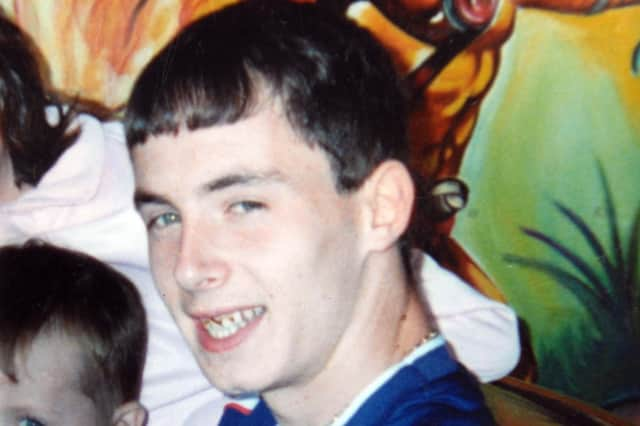Coroner's findings on first fatal PSNI shooting incident in Co Antrim complied with human rights standards says judge


Mr Justice Colton rejected claims by the mother and partner of Neil McConville that conclusions reached at the inquest into his death did not go far enough.
“On any fair reading the coroner has complied with the procedural obligations,” he said.
Advertisement
Hide AdAdvertisement
Hide AdMr McConville, 21, was shot and fatally wounded by a police officer following a car chase in Glenavy, Co Antrim back in April 2003. Police mounted an operation to stop the Vauxhall Cavalier he had been driving due to suspicions that a firearm was being transported.
One officer at the scene opened fire three times amid fears Mr McConville was about to drive over a colleague knocked down at the scene. The father of two died from a gunshot wound to the chest.
In April 2022 an inquest into his death found that the use of lethal force was justified.
However, Judge Philip Babington, sitting as coroner, also held that the police operation was not planned and controlled in a way that minimised the possible need for such force.
Advertisement
Hide AdAdvertisement
Hide AdLegal challenges to his findings were mounted by Mr McConville’s mother, Colette, and his partner at the time, Caoime McCann. It was contended there had been unlawful failures to address how he came by his death or express a conclusion on major issues which arose at the inquest.
Those included the culpability of the officer who shot the deceased, referred to as HH, in inadvertently selecting the fully automatic mode on his gun.
Counsel for the applicants claimed the outcome was irrational and breached requirements within Article 2 of the European Convention on Human Rights on a series of points:
- An alleged failure to conclude whether the firing of the second and fatal shot was justified or absolutely necessary.
Advertisement
Hide AdAdvertisement
Hide Ad- A failure to reach a conclusion about tactical advice provided during the police operation.
- Alleged failures to state conclusions on issues of planning and intelligence.
Mr Justice Colton was told the inquest heard evidence from 45 witnesses over a 25-day sitting, including an eyewitness to the incident, 29 police officers, seven civilians, three ballistic experts, three forensic pathologists, an engineer and a military witness.
Lawyers representing the coroner resisted the challenge by insisting he reached his verdict after examining in detail all available evidence and fulfilling the Article 2 obligation.
Advertisement
Hide AdAdvertisement
Hide AdIdentifying no illegality or irrationality, Mr Justice Colton cited the acceptance that the police officer honestly believed it was necessary to use force to defend another person.
“In particular (the coroner) accepted that HH made a conscious decision to open fire in circumstances which were justified,” the judge pointed out. “Therefore, at some point he had to move the weapon from the safety mode.”
The judge acknowledged Mr McConville’s relatives were entitled to an Article 2 compliant inquest into his killing at the hands of the PSNI, describing it as a tragedy.
But refusing to grant a judicial review, he held that the coroner met the required legal standards in reaching findings which were critical of the police operation.
Advertisement
Hide AdAdvertisement
Hide Ad“He has determined whether the force used in this case was or was not justified,” the judge said.
“He has conducted a thorough examination of all the relevant and background information relating to the killing.
“That examination has been conducted in public and the evidence has been thoroughly tested.”